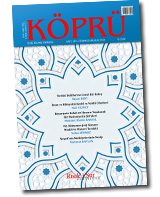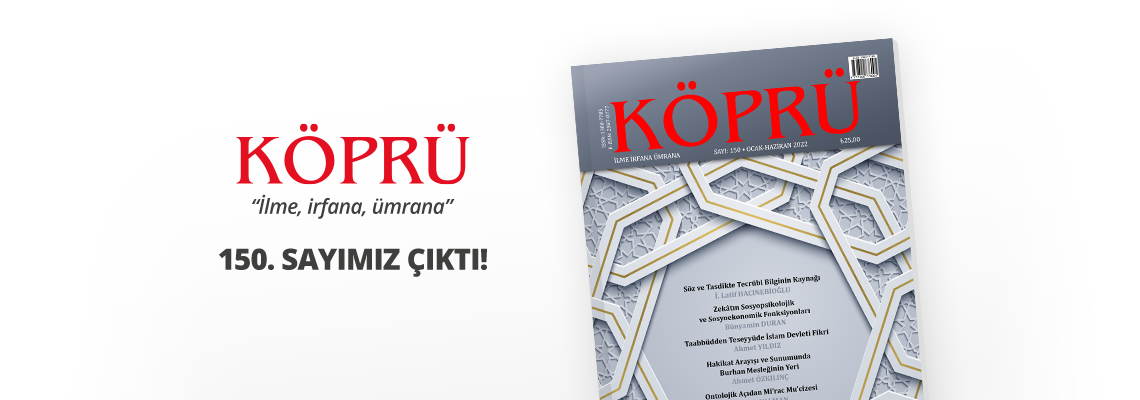Köprü Anasayfa

Temmuz-Aralık 2021
"Köprü" 149. Sayı
-
Editörden
Editorial
Mehmet Kaplan
Sosyolog, Risale-i Nur Enstitüsü
Köprü’nün 149. sayısında birbirinden değerli çalışmalar ile huzurunuzdayız. Dergimizde toplam yedi makale ve Risale-i Nur’dan “Nübüvvet” hakkında seçme metinler yer almaktadır.
İlk makalemiz Niyazi Beki tarafından kaleme alınan “Tevhid Delillerine Genel Bir Bakış” başlıklı yazıdır. Makale, kâinatın yaratılmasının en önemli sebebi, Allah’ın varlığı ve birliğine şahitlik yapmasıdır diyerek başlamakta ve makalede kâinatın tevhidin delilleri olarak ele alınıp incelenmesi vurgulanmaktadır. Tevhidin şahitleri olan delillerin silsilesini Katre Risalesi’nde Bediüzzaman Said Nursi’nin elli beş halkadan müteşekkil kopmaz bir halat şeklinde takdim ettiğini vurgulamakta, İslam âlimlerinin ve Risale-i Nur’da Bediüzzaman’ın dile getirdiği bazı tevhid delillerini ele almaktadır.
Nail Yılmaz “İman ve Hidayetin Kesbî ve Vehbî Cihetleri” isimli makalesinde, enfüsî ve afakî burhanların imana bakan cihetleri, teklife muhatap olan akıl, kalp ve vicdan ile irade-i cüziye, cüz’-i ihtiyari ve ruhun hiyerarşik yapısını ele almaktadır. Kesbî hidayet, vehbî hidayet ve fıtrî hidayet arasında bir mukayese yaparak, İslâm’ın, vahy ve fıtrat gibi, iki esasa istinad ettiğine dikkat çekmektedir.
Mehmet Abidin Kartal “Beşeriyete Refah ve Huzuru Yaşatacak Bir Medeniyetin Şifreleri” isimli makalesinde, beşeriyete refah ve huzuru yaşatacak medeniyetin İslam medeniyeti olduğu üzerinde durmaktadır. Batı medeniyetinin insanlara ve toplumlara yaşattığı ekonomik, finansal ve sosyal krizleri aşmak için israfa karşı iktisatlı bir hayat anlayışını, zevk-eğlence düşkünlüğüne ve tembelliğe karşı da namuslu, alın teriyle çalışmayı hâkim kılmak gerektiğini ifade etmektedir. Gelir dağılımındaki adaletsizliği gidermek ve üretimi arttırmak için de Kur’an’daki zekât emri ve faiz yasağını dünya ölçeğinde uygulamak gerektiğini vurgulamaktadır.
Selim Sönmez ise “Hz. Süleyman (as) Kıssası: Maddi ve Manevi Terakki” başlıklı makalesi ile yer almaktadır. Makalede, Hz. Süleyman’ın (as) hayatı Kur’an-ı Kerim ve hadis-i şeriflerin verdiği bilgiler çerçevesinde ele alınmaktadır. Kur’an’da, Hz. Süleyman (as) güç ve iktidar sahibi olunca ve bu gücünü kaybedince yaptığı davranışları ile nazara verilerek bu tutumlardan dersler çıkarılması istenmiştir. Bu derslerle dünyevi gelişme için gerekli motivasyonlar sağlandığı gibi uhrevi âlem için de yönlendirici tavsiyelerde bulunulduğunu ifade etmektedir.
Mahmut Kaplan, “Neşatî’nin Methiyelerinde Nesip” isimli makalesinde, Neşatî’nin divanında yer alan kasidelerinin nesip bölümlerini incelemektedir. Çalışma, şairin methiye türünde nelere dikkat ettiğini, neleri anlattığını ve nasıl tasvirler yaptığını tespit ederek kasideciliğinin nesiplere yansıyan özelliklerini ortaya koymaktadır.
Vehbi Kara ise “Bediüzzaman Said Nursi’nin Eski Said Dönemi” isimli makalesiyle yer almaktadır. Bediüzzaman Said Nursi’nin bir İslam âlimi olduğu gibi Osmanlı devletinin son döneminde ve Türkiye Cumhuriyeti tarihinde önemli rollere sahip olduğunu vurgulamakta ve Bediüzzaman Said Nursi’nin “Eski Said” olarak isimlendirilen gençlik dönemini genel olarak ele alıp incelemektedir.
Ali Arslan ise “Afganistan’ın Türkistan Hedef Alanı ve Fergana Kilitmekânı Stratejileri için Önemi” isimli makalesiyle yer almaktadır. Afganistan’ın da dâhil olduğu coğrafyada yaşanan rekabetleri dikkate alarak günümüzde hatta önümüzdeki dönemde yaşanacaklar hakkında bazı tahliller yapmaktadır. ABD’nin yeni stratejisi nedir? Afganistan hangi stratejik hedef alanının kenarındadır? Hangi kilitmekânın bir parçasıdır? Bu gibi sorulara stratejileri kavramak için bir laboratuvar olan tarihe müracaat ederek cevaplar aramaktadır.
Son olarak “Risale-i Nur’da Nübüvvet” muhtevalı hazırladığımız Risale-i Nur eserlerinden seçilmiş metinler yer almaktadır.
Sizi yazılarla baş başa bırakırken bir sonraki sayımızda görüşmek üzere inşaallah.
We are in the presence of you with valuable articles which offer solutions to the current issues of humanity, while shedding light on the future in the number 149 of Köprü/Bridge journal. There are a total of ten works in our journal. There are seven articles, workshop final declaration and selected passages of “Prophethood” from Risale-i Nur.
Our initial article is an article entitled “An Overview of the Evidences of Tawhid” which is written by Niyazi Beki. The article begins by saying that the most important reason for the creation of the universe is that it witnesses to the existence and oneness of Allah. The article emphasizes the examination of the universe as evidences of oneness. It is emphasized that Bediuzzaman Said Nursi presented the series of evidences, which are the witnesses of oneness, as an unbreakable rope made up of fifty-five loops in Risale of Katre. Some of the proofs of tawhid expressed by Islamic scholars and Bediuzzaman in Risale-i Nur are discussed.
Nail Yılmaz in his article titled “The Kasbi and Vehbi Aspects of Faith and Guidance” discusses the aspects of the spiritual and afaki proofs that look at faith, the mind, heart and conscience, the will of juziye, partial of the elder and the hierarchical structure of the soul. By making a comparison between kasbî guidance, vehbi guidance and natural guidance, he draws attention to the fact that Islam is based on two principles, such as revelation and fitra.
Mehmet Abidin Kartal with his article titled “The Codes of a Civilization That Will Bring Prosperity and Peace to Humanity” emphasizes that the civilization that will bring prosperity and peace to humanity is the Islamic civilization. He states that in order to overcome the economic, financial and social crises caused by Western civilization to people and societies, an economic understanding of life, which is against waste, should prevail. He states that it is necessary to dominate honest work and hard work against pleasure-entertainment and laziness. It is emphasized that in order to eliminate the injustice in income distribution and increase production, it is necessary to apply order of zakat and the prohibition of interest in Qur’an on a world scale.
Selim Sönmez takes part with the article entitled “The Story of Solomon (pbuh): Material and Spiritual Progress”. In the article, the life of Solomon (as) is discussed within the framework of the information given by Qur’an and hadiths. In Qur’an, it is asked to learn lessons from these attitudes by showing the behaviors that Solomon (pbuh) did when he gained power and lost this power. It is stated that these lessons provide the necessary motivations for worldly development as well as guiding recommendations for the otherworldly realm.
Mahmut Kaplan in his article titled “Nesip in Neşati’s Praises” examines the nesip parts of the qasidas in Neşati’s divan. The study reveals the features of the poet’s eulogy reflected on the nesips by determining what he pays attention to, what he tells and how he describes it.
Vehbi Kara takes part with the article entitled “The Old Said Period of Bediuzzaman Said Nursi”. It is emphasized that Bediuzzaman Said Nursi, as an Islamic scholar, played an important role in the last period of the Ottoman state and in the history of the Republic of Turkey. The youth period of Bediuzzaman Said Nursi, which is called “Old Said”, is discussed and examined in general.
Ali Arslan takes part with the article entitled “Importance of Afghanistan for Turkistan Target Area and Fergana Key Space Strategies”. Considering the rivalries in the geography including Afghanistan, some analyzes are made about what will happen today and even in the future. What is the new strategy of the USA? On the edge of which strategic target area is Afghanistan? Which keyspace is it part of? Answers to such questions are sought by referring to history, which is a laboratory to grasp strategies.
Finally, there is the text that we prepared for “Prophethood in Risale-i Nur” content.
While leaving you with articles, we hope to be in the presence of you with the subsequent issues.
-
Editörden
Mehmet Kaplan
Yazıyı okumak için tıklayınız... -
Tevhid Delillerine Genel Bir Bakış
Niyazi Beki
Yazıyı okumak için tıklayınız... -
İman ve Hidayetin Kesbî ve Vehbî Cihetleri
Nail Yılmaz
Yazıyı okumak için tıklayınız... -
Beşeriyete Refah ve Huzuru Yaşatacak Bir Medeniyetin Şifreleri
Mehmet Abidin Kartal
Yazıyı okumak için tıklayınız... -
Hz. Süleyman (as) Kıssası: Maddi ve Manevi Terakki
Selim Sönmez
Yazıyı okumak için tıklayınız... -
Neşatî’nin Methiyelerinde Nesip
Mahmut Kaplan
Yazıyı okumak için tıklayınız... -
Bediüzzaman Said Nursi’nin Eski Said Dönemi
Vehbi Kara
Yazıyı okumak için tıklayınız... -
Afganistan’ın Türkistan Hedef Alanı ve Fergana Kilitmekânı Stratejileri için Önemi
Ali Arslan
Yazıyı okumak için tıklayınız... -
Risale-i Nur’da Nübüvvet
Bediüzzaman Said Nursi
Yazıyı okumak için tıklayınız...
